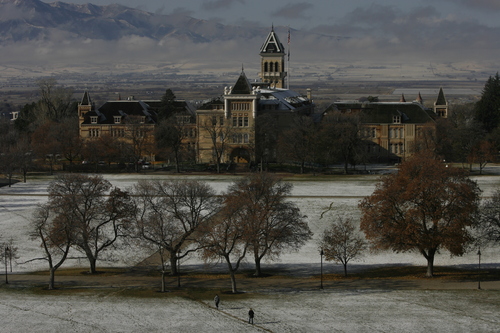This is an archived article that was published on sltrib.com in 2014, and information in the article may be outdated. It is provided only for personal research purposes and may not be reprinted.
A Las Vegas-based company is suing Utah State University after the institution backed out of a contract to build advanced weather-sensing satellite instruments.
GeoMetWatch Corp. alleges in a lawsuit filed in U.S. District Court in Salt Lake City that USU and a new partner stole its trade secrets and pushed the company out of a potentially lucrative deal. It's asking a federal judge to stop USU and businessman Alan Hall from trying to send the instruments into space and sell the weather data.
"One simply doesn't anticipate that a university would violate the trust of its business partners, which we believe the evidence … clearly demonstrates," said CEO Edward Keible Jr. in a statement.
A USU spokesman says the allegations are "without merit," and the university will "vigorously defend itself in court."
The relationship began publicly in 2010, with the then-CEO of GeoMetWatch promising to bring hundreds of millions of dollars worth of contracts to Logan to build the infrared instruments that provide faster, more detailed information about oncoming hurricanes, tornados and floods.
The state put almost $3 million of taxpayer money in the project through the research-investment agency USTAR; some of that money went to GeoMetWatch in exchange for company shares, according to the lawsuit. Last year, things seemed to be moving forward with the announcement that the instruments would go into space on an Asian telecommunications satellite in 2016.
But in March, USU pulled out, saying the company had failed to secure $170 million in collateral needed to put the instrument on the satellite. The institution quickly inked a new deal with Hall, saying GeoMetWatch's failure put them in a tough spot with less than 90 days to pull together the cash.
A spokesman for Hall's new company, Tempus Global Data Inc., declined to comment on the suit.
But GeoMetWatch says USU's Robert Behunin, the vice president of commercialization, had promised to put up the collateral and it was left in the lurch when his office reneged — after the company gave a university subsidiary, the Advanced Weather Systems Foundation, money to keep the program going.
"When you take $1.6 million from a little start-up company of five or six guys and hand it to someone else, there's something wrong there," Keible said in an interview.
He acknowledged the "finances got scrambled" late last year and the Asian satellite deal had to be delayed. That's when Hall entered the picture as a potential investor.
The lawsuit alleges GeoMetWatch shared "dozens of highly sensitive and confidential … files" with Hall via Dropbox, but instead of investing Hall and USU took the files and shoved the company out.
They "systematically and very rapidly usurped GMW's business position," the suit states, using the company's "own trade secrets and inside knowledge" to freeze them out of the Asian satellite deal the company had created.
Asked whether the company has taken too long to fulfill its original promises, Keible said the long-term plan to put six of the instruments on satellites circling the globe is a "minimum 12 to 15 year program."
"It takes a lot of time and effort," he said. "This is big money, and until you get the [instrument] in the sky you can't sell the data."
The company has now contracted with another business to build the instruments and compete with their old partners, though Keible said they're far behind.
No hearings have yet been set in the case, which also seeks unspecified damages.



